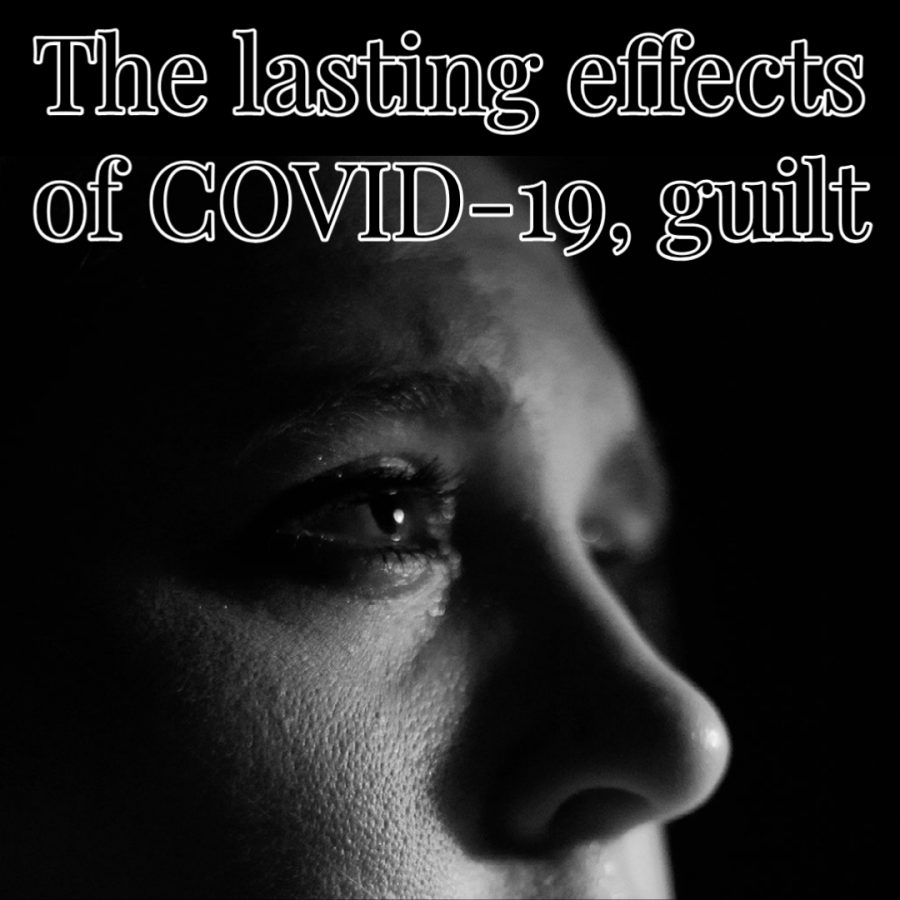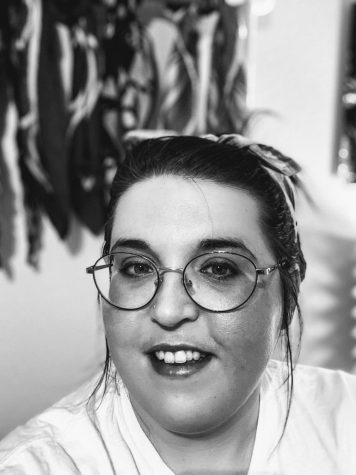We’ve officially hit the one-year mark since COVID-19 forever changed our lives. I had hoped to make it this far avoiding the archenemy of society, coronavirus.
Unfortunately, I wasn’t so lucky when I went against the holiday orders to stay at home. I infected my family, and the lingering effects of COVID-19 encompassed not only deep-seated lethargy, but also immense guilt.
American psychotherapist Peter Breggin theorizes why humans develop guilt. “The existence of violent impulses would have made it difficult or impossible for humans to live in close-knit families and clans without destroying each other. Nature’s answer was the development of guilt, shame and anxiety — internal emotional inhibitions or restraints specifically against aggressive self-assertion within the family and other close relationships,” Breggin said.
The Evolutionary Behavioral Sciences journal published a study illustrating that shame helps us maintain our reputations around others where guilt, in contrast, appears to help us maintain our self-respect and moral values.
My COVID-19 symptoms began one morning upon opening my eyes to the sunlight filtering through my parents’ guest bedroom window. My head ached with a righteous pain once my eyes opened. Pressure kept mounting between my eyes, the kind of pressure that deep sea divers experience as the immense pressure of water settles upon their bodies.
As I lay in bed, trying my hardest to go back to sleep to avoid my mounting headache, I started to notice my nose feeling stuffy with mucus. That awful feeling when one nostril feels so stuffed that you imagine that you’ll never be able to breathe through it ever again. The other nostril while allowing you to breathe decides it will now act like a leaky faucet where snot continuously dribbles out onto your upper lip.
As the morning progresses, my throat gets involved in this menagerie of symptoms. It’s one of those coughs caused by your throat’s disdain for the snot sliding down it with every swallow. It’s a dry cough, but ever-persistent, never leaving you for very long.
In hopes of resolving what I believed at the time to be allergy symptoms I swallowed a few ibuprofen, sprayed allergy medication up my nose and hoped to feel better by the time my brother and niece came over to begin our Christmas celebrations.
It would be the next day that I would receive a call from my friend, my one companion during this pandemic, telling me that her mom had contracted coronavirus. She was on her way to self-quarantine until she discovered the results of her COVID-19 test.
This is when some of the panic began to set in and my mind dabbled in some rigorous mental gymnastics to explain why I couldn’t possibly have COVID-19. We had recently had a movie night at my apartment where no masks or social distancing were present. The hope was that somehow I didn’t have coronavirus, that my current symptoms were just a coincidence.
Then, like a sign from a pantheon of gods, I lost my sense of smell. My anxiety skyrocketed because it was becoming harder and harder to deny that I likely had COVID-19. Worse yet was the likelihood that I just gave it to my entire family.
Rajiv Rimal, the health, behavior, and society department chair at the Johns Hopkins Bloomberg School of Public Health shared his worries that generating guilt as a motivator for COVID-19 will be counterproductive in an interview with Bustle. All generating guilt does is create shame and stigma, which often leads to pushing unhealthy behaviors underground. This type of guilt focuses on blaming the individual rather than the system(s) that aren’t working.
There is worry that the shame created from COVID-19-related guilt can lead to people hiding their diagnoses from others. In an attempt to pretend things are normal, they will interact with other people as if everything is fine while they infect them.
When my friend told me she tested positive for coronavirus, I had a lightning-fast thought about keeping that information secret from my family. As quick as it came, it dispersed; the guilt of lying to them on top of the possibility that they now had the coronavirus was too much for me to bear.
It took one night of movies and gossip for me to contract coronavirus and one eight hour road trip for me to spread it even further. So easily and silently COVID-19 slithered through all of our lives! A virus in the form of a snake, biting us one at a time, sending COVID coursing through our bodies where it would make its home for weeks to come.
I had created my own little super spreader event that I could only pray had ended with my family and had not continued to slither its way into other people’s lives. All those fears I had at the beginning of this pandemic resurfaced. What if I just gave my parents COVID? I had mild symptoms, but what if they have more complications?
Roseann Capanna-Hodge, a licensed professional counselor, talked about the guilt and shame surrounding testing positive for COVID-19 in a Healthline article.
“For those that have underlying health concerns or live with someone who does, when they test positive with COVID-19, their anxiety is naturally much greater,” Capanna-Hodge said.
Only a few years ago, we discovered my father had an extremely rare autoimmune disease, and since the pandemic began we all worried about its effects on his immune system. I remember sitting alone in my apartment, wondering if I was going to be the reason my father died. Could I live with that kind of guilt?
The answer would have been an absolute and resounding no, I wouldn’t have been able to live knowing I played a role in his death. My father is the boat in which the rest of the family is tethered. Regardless of what storm comes our way he bows up and down the waves keeping us afloat.
God help me if my mother had had severe COVID symptoms. She’s been living in a persistent state of fear since the pandemic began, developing a new form of agoraphobia that’s tied specifically to the coronavirus. I brought that fear straight to her front door, her last safe haven from a pernicious virus, and let it slowly seep into her lungs.
I would test positive for COVID upon returning to Chico and then proceed to wait for my parents test results. As the whole family had assumed, they both tested positive and we all entered quarantine.
I spent the next two weeks acting like an anxious mess, calling parents more frequently than I ever have before. If I didn’t receive a phone call within a day or two of the last call my brain would create cruel imagery. I’d imagine them wheezily calling an ambulance that upon arrival would quickly whisk them away to the hospital where they would immediately be put on ventilators.
We all got lucky. Our symptoms were mild. If anything, it has been the long lasting lethargy that has taken a toll on our family; it’s a constant exhaustion that doesn’t help one’s mental health.
Now, I feel a strange sense of shame that weighed me down, feeling like an attempt to drown me. No one has placed it there but myself. I feel like I should have a large scarlet letter on my clothes. Maybe a brilliant red C-19 safety-pinned to my shirt. A beacon of my failure to my family and society.
If you’ve ever felt guilt, you know it can be a powerful emotion — one that can sometimes be physically felt. A 2013 study by Princeton University found that we genuinely feel “heavy” when it comes to the weight of our deeds when experiencing guilt.
Guilt can be a private affair where you think about your transgressions or wrong-doings. Not to be confused with shame, where we think about the opinions and disapproval of others when we’ve done something wrong.
June Tangney, a psychology professor at George Mason University and co-author of “Shame and Guilt,” commented about the difference between guilt and shame, particularly when it comes to how we see ourselves. Guilt makes us reflect that we did a bad thing, while shame makes us believe we are a bad person.
It was that feeling of shame that would sometimes sneak into my mind and plague it with the idea that I was somehow a bad person for allowing this to happen to my family. My family hasn’t pointed a finger at me and yelled that I am a shameful person for bringing COVID into our lives, rather I put the guilt and shame upon my own shoulders.
One of the biggest worries people have concerning COVID is the fear of being shunned by others once they know they’ve had the virus. These feelings stem from lack of control, comments Lauri Pasch, professor of psychiatry at the University of California.
“When something happens that’s out of your control completely, it doesn’t feel good to be out of control, so you look for ways that you can explain it,” Pasch said. “One of the ways is, ‘I must have done something.’”
This feeling becomes especially prominent because of all the recommendations for safety and precaution concerning coronavirus. You begin to worry that you didn’t follow the mask mandate as closely as you should have, or kept the advised 6 feet apart at all times.
When you infect a family member or close friend, the natural reaction is to blame yourself, and the heavy feeling of guilt begins to weigh you down. Luckily, Pasch has some recommendations for how to deal with the guilt.
The first thing that she recommends is to get what you are feeling guilty about out in the open. You need to tell others, or the feelings will continue to fester in your mind, leading to the feelings of shame and worthlessness.
One of the best ways to get your guilt in the open is to share it with family members, a therapist or even with yourself. Remind yourself that festering in guilt isn’t productive and will lead to nowhere. Ask yourself: How can I turn this guilt into something that helps me face future challenges?
Ellen Hendriksen, a clinical psychologist at Boston University’s Center for Anxiety and Related Disorders, said in an interview with the American Heart Association that guilt can be triggered when people review the past.
“We have to remember that we didn’t have access in the past to the knowledge and experience we have in the present,” Hendriksen said. “That we didn’t know we were carrying it. We would have done things differently had we had access to that knowledge.”
I’ve been trying to think in the manner Hendriksen suggests, but after almost a full year of coronavirus I can’t help but think that I should have somehow known I had COVID-19. I should have been safer and obeyed the stay-at-home orders.
I can’t change the choices I made, I can only move forward. I got lucky that all my family made it through COVID-19. I get to cherish the time we still have together.
I don’t think I’ll be rid of my guilt for a long time because I don’t know what the long-term effects of this virus are and how they will affect my family in the future. It’s already gotten better with the dissemination of the vaccine and like all things, time helps people heal.
Erin Holve can be reached at orionmanagingeditor@gmail.com and @Erin_Holve on Twitter.
Tags: COVID-19, guilt, shame, family, coronavirus symptoms








